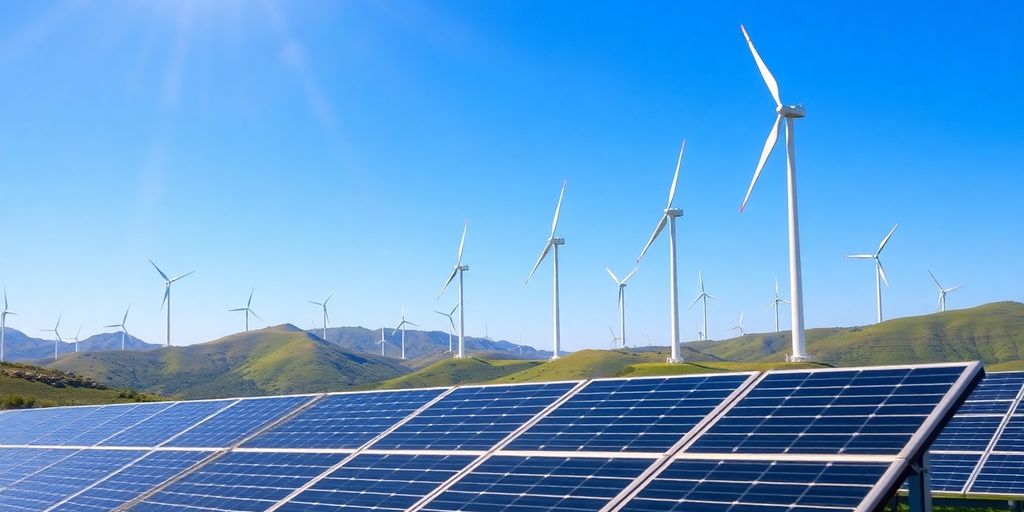Turkey is making significant strides towards achieving energy independence, as highlighted by President Recep Tayyip Erdoğan during the Istanbul Energy Forum. The event brought together key stakeholders in the energy sector to discuss Turkey’s ambitious plans for renewable energy and reducing foreign dependency.
Key Takeaways
- Turkey aims to be among the top three countries in Europe for renewable energy by 2025.
- The country is focusing on energy supply security amid global tensions, particularly the Russia-Ukraine conflict.
- Investments in clean and renewable energy have increased significantly over the past two decades.
Turkey’s Vision for Energy Independence
President Erdoğan emphasized the importance of energy as a cornerstone for development, stating, "Energy, along with transportation and communication, is the engine of development." He noted that energy supply security is critical for both developing and developed nations, especially in light of recent geopolitical crises.
Erdoğan pointed out that Turkey has managed to navigate the energy challenges posed by the ongoing war between Russia and Ukraine, thanks to its balanced diplomatic relations with both countries. He stated, "Our European friends have felt the energy crisis triggered by the war firsthand and experienced immense hardships."
Commitment to Renewable Energy
Turkey has set ambitious goals for renewable energy, aiming to increase its share in total installed energy capacity to 60% by 2025. Erdoğan announced plans to expand wind and solar energy capacity from 31,000 megawatts to 120,000 megawatts by 2035.
- Current Renewable Energy Capacity: 31,000 megawatts
- Target Renewable Energy Capacity by 2035: 120,000 megawatts
Strategic Resource Development
The Turkish government is also focusing on maximizing its natural resources, including oil, natural gas, and rare earth elements. Erdoğan highlighted recent discoveries, such as the second-largest rare earth elements reserve in the world located in Eskişehir, which is crucial for advanced technology and defense industries.
He stated, "We are planning to start production in one of the gold fields in Niger by 2025," showcasing Turkey’s commitment to exploring resources both domestically and internationally.
Environmental Responsibility
While pursuing energy independence, Erdoğan stressed the importance of environmental sustainability. He stated, "We pursue human-focused policies that cause no harm to nature," emphasizing the need to balance energy production with environmental protection.
Turkey has invested heavily in clean energy projects over the past 22 years, including wind, geothermal, solar, and nuclear energy. The Akkuyu Nuclear Power Plant is expected to meet 10% of Turkey’s electricity needs once operational, further contributing to the country’s energy security.
Conclusion
Turkey’s ambitious energy independence goals reflect its commitment to sustainable development and economic growth. By focusing on renewable energy and reducing foreign dependency, Turkey aims to secure its energy future while addressing environmental concerns. The Istanbul Energy Forum served as a platform for discussing these critical issues, bringing together leaders and experts to collaborate on a shared vision for a more independent and sustainable energy landscape.
Sources
- The Republic of Türkiye Directorate of Communications, İletişim Başkanlığı.
- Cumhurbaşkanı Erdoğan: “Enerjide tam bağımsız Türkiye hedefiyle yolumuza emin adımlarla devam ediyoruz” | Türkiye Cumhuriyeti | İletişim Başkanlığı, İletişim Başkanlığı.
- Erdoğan, Türkiye’nin 2025 yılına kadar yenilenebilir enerjide Avrupa’da ilk 3’e girmeyi hedeflediğini açıkladı | Türkiye Cumhuriyeti | İletişim Başkanlığı, İletişim Başkanlığı.






